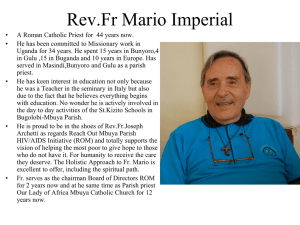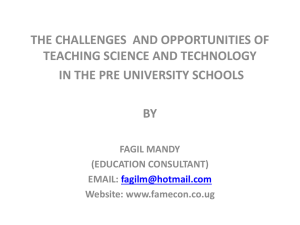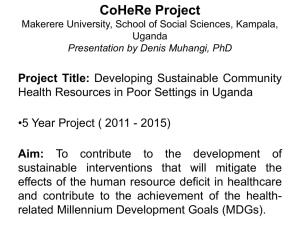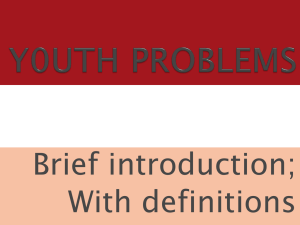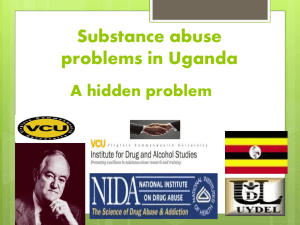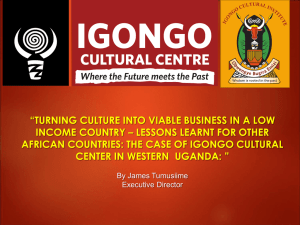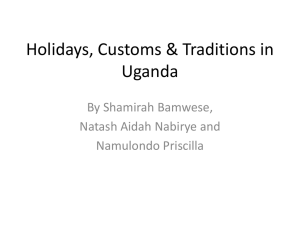2nd EnerGEO Summer School - GEPW
advertisement
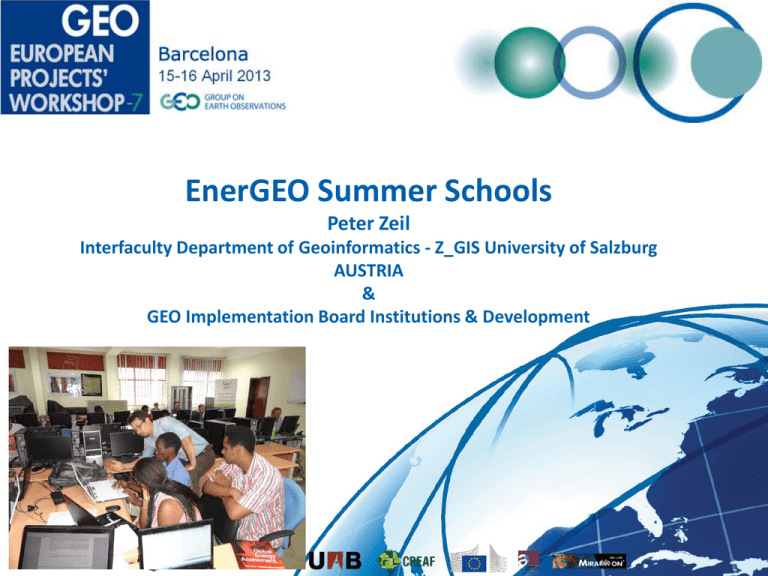
EnerGEO Summer Schools Peter Zeil Interfaculty Department of Geoinformatics - Z_GIS University of Salzburg AUSTRIA & GEO Implementation Board Institutions & Development • What is a ‘Summer School’? • What is a GEO Summer School? • The 2nd EnerGEO Summer School in Kampala • Outcomes & recommendations Summer School Concept Intensive event Group work Science – policy dialogue Building networks Summer School Evaluation of concepts Exploring thematic linkages Outreach Sharing of expertise GEO Summer Schools Should support the strategic objectives of GEO I&D: • Networking activities that specifically build individual, institutional and infrastructure capacity. • Leveraging dedicated resources for Earth observation capacity building efforts. • Uptake of Earth observation in policy and decision making. • Enhanced participation of Developing countries in GEO and GEOSS and in addition: • Link to other SBAs: ecosystems, health, agriculture, impact assessment of human activities • Direct support to tasks: Bioenergy Atlas, AfriGEOSS EnerGEO Summer Schools Science-Policy Dialogue 1 Energy policy context (continental, regional, local) sharing sharing sharing Concepts, methodologies & demonstration Evaluation of concepts Group work Networks Interdisciplinary /intersectorial Preparation of assignment lectures & hands-on sessions Fieldtrip Discussions with local communities Free day Case studies, Outcomes & recommendations, Preparation of panel discussion Scientific seminar Best Poster Science-Policy Dialogue 2 Closing Ceremony Evaluati on & Individu al consulta tion 1st EnerGEO Summer School 1st EnerGEO Summer School – topics / reco Policy requirements Research topics Lack of information about RE potentials Longterm thinking Science policy dialogue Scenario modelling New grids: - Energy exchange - Local scale Social dimension of energy Integration of RE in energy mix Natural emissions Impact on water resources 2nd EnerGEO Summer School Unlocking the renewable energy potentials for Africa - Biomass & Solar Energy and the impact on the Environment 10 EnerGEO Summer School March 4 – 13 2013 Unlocking the renewable energy potentials for Africa Mon Introduction Energy policy context (continental, regional, local) Ministry of Energy Uganda Business Promotion Agency Centre for Renewable Energy Research – Kenya, Africa-EU Energy Partnership 11 EnerGEO Summer School March 4 – 13 2013 Unlocking the renewable energy potentials for Africa Tue - Thu Concepts & demonstration (lectures &hands-on) Biomass resources (assessment, modeling of demand and supply) Solar (potential, modeling of demand and supply 12 EnerGEO Summer School March 4 – 13 2013 Unlocking the renewable energy potentials for Africa Fri - Sat Fieldtrip Kampala Landfill site Solar kiosk in remote rural area Hydro power station at the Nile Sugar Cane Indigenous forest 13 EnerGEO Summer School March 4 – 13 2013 Unlocking the renewable energy potentials for Africa Mon - Tue Review of Fieldtrip Preparation of assignment Case studies, Outcomes & recommendatio ns, Preparation of panel discussion (policy) Scientific seminar Best Poster Closing Ceremony 14 EnerGEO Summer School March 4 – 13 2013 Unlocking the renewable energy potentials for Africa Wed Evaluat ion 17 participants from Uganda, Kenya, Ethiopia, South Africa, United Kingdom and Italy & Individ ual consult ation with backgrounds in academia, government institutions, private enterprises 15 EnerGEO Summer School March 4 – 13 2013 Lecturers Martijn Schaap Markus Tum Thomas Wanderer Markus Biberacher Richard Okou Elizabeth Kaijuka Samuel Kalimunjayi Yonah Turinayo Harold Turinawe John Richard Otukei Emmanuel Male Peter Zeil TNO, The Netherlands DLR, Germany DLR, Germany Research Studios, Austria Department of Electrical Engineering, Makerere University, Uganda Department of Electrical Engineering, Makerere University, Uganda National Forest Authority, Uganda National Forest Authority, Uganda National Forest Authority, Uganda Department of Geomatics and Land Management, Makerere University, Uganda Department of Geomatics and Land Management, Makerere University, Uganda University of Salzburg, Department of Geoinformatics - Z_GIS, Austria 16 2nd EnerGEO Summer School - outcomes ASSESSMENT AND ENERGY POTENTIAL OF BIOMASS IN UGANDA CHALLENGES The Biomass energy challenge in Uganda is centered on lack of a mix of energy sources in power generation, low level of access to modern energy, inadequate infrastructure for generation, transmission and distribution and low level of energy efficiency. 2nd EnerGEO Summer School - outcomes Solar energy strategy for Uganda RECOMMENDATIONS: Empowering institutions with knowledge of solar energy for sustainability We need to implement and maintain a Spatial data infrastructure SDI- to obtain the right information at the right time for the right purpose achievements • Linking EU & African energy research • Linking Geomatics & RE research at Makerere University • Linking Spatial RE assessment & donor agencies • Initiating collaboration between RE Research in Kenya & Uganda • Enlarging the community for the Bioenergy Atlas for Africa incl. the Africa-EU Energy Partnership and IRENA • Advocacy for GEO Data Sharing principles challenges • Coordination between GMES & GEO Evaluation report on a Bioenergy Atlas for Africa proposal (SPACE call 2013) – …. is essentially based on recommendations which come from the EO/GEO community and does not demonstrate that it addresses enduser needs. – …. the added value of the project is more explicit at the level of international initiatives rather than on GMES and the proposed project's end-users. • The next EnerGEO Summer School: October 2013 – Utrecht The Netherlands Thank you


